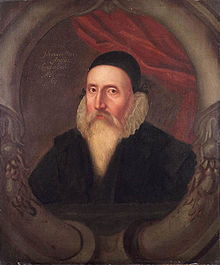Dr. John Dee
 Lifetime Learning‘s UVA at Oxford Seminar (sold out) will take place at Trinity College, University of Oxford from September 14-20, 2019. Jeanie Grant Moore and UVA’s Andrew O’Shaughnessy will lead an in-depth exploration of “The Old World and the New: Britain and America.” In this article, Ms. Moore puts an interesting twist on the colonization of the New World, evoking images of crystal balls and comets. Ms. Moore teaches in the English department at the University of San Diego and is Professor Emerita of English from the University of Wisconsin Oshkosh.
Lifetime Learning‘s UVA at Oxford Seminar (sold out) will take place at Trinity College, University of Oxford from September 14-20, 2019. Jeanie Grant Moore and UVA’s Andrew O’Shaughnessy will lead an in-depth exploration of “The Old World and the New: Britain and America.” In this article, Ms. Moore puts an interesting twist on the colonization of the New World, evoking images of crystal balls and comets. Ms. Moore teaches in the English department at the University of San Diego and is Professor Emerita of English from the University of Wisconsin Oshkosh.
Where would be without John Dee? We welcome your comments below!
Americans, consider this question: are we here because of a magician? If we are talking about early immigration by the English, we could answer, “Partly true!”

In the mid- to late-1500s, England found itself a bit behind the times in colonizing the New World, whereas Spain, Portugal, France, and others had already made significant claims. Certainly, English explorers had made notable voyages to the Americas, led by seamen such as John Cabot, Sir Francis Drake, Sir Humphrey Gilbert, and Sir Walter Raleigh, but, even so, no English settlements existed on American shores before 1587. Raleigh famously advocated for colonization, but there were others too, such as Dr. John Dee, who encouraged Queen Elizabeth to claim her “rights” in America. Dee had the ear of the Queen, as he was her magician: even before her reign began, he was called upon to select the most favorable day for her coronation according to his astrological calendar. And later, when he was summoned to interpret the meaning of a comet that had caused her great consternation, he used the opportunity to curry favor, telling her it was a fortuitous sign for her reign. Elizabeth visited Dee at his home in Mortlake, stopping by especially to see his magic glass or crystal ball. (Dee’s diary notes that she smiled mysteriously as she gazed into it.) Dee is probably best remembered as a conjuror, but he also enjoyed a well-deserved reputation as an esteemed scholar, with one of the most extensive libraries in England at the time. A mathematician, astronomer, navigator, mapmaker, cosmographer, writer, and scientist, Dee was frequently called to court to serve the Queen in a variety of ways, and even acted as a spy for her on the continent.
 As a mathematician and navigator, Dee instructed many of the English explorers of the time, mapping out their voyages; in fact, he wrote the proposal for Sir Francis Drake’s circumnavigation of the globe. One of the strongest advocates of colonization, Dee insisted that the Queen was not only entitled to colonize, but also had a duty to do so. He created a persuasive treatise and an expansive map, detailing all that was known of the east coast of North America, supplementing it with reasons why she should claim England’s place in the New World. The Queen, he said, already had justification to settle in America since King Arthur, among others, had once traveled there (!). This myth and others like it had circulated before Elizabeth’s day, but Dee’s other reasons had more substance, such as the way that the establishment of colonies across the sea would serve England’s desire for maritime dominance. His passionate plea for expansion called for a worldwide “British Empire,” a term first coined by Dee.
As a mathematician and navigator, Dee instructed many of the English explorers of the time, mapping out their voyages; in fact, he wrote the proposal for Sir Francis Drake’s circumnavigation of the globe. One of the strongest advocates of colonization, Dee insisted that the Queen was not only entitled to colonize, but also had a duty to do so. He created a persuasive treatise and an expansive map, detailing all that was known of the east coast of North America, supplementing it with reasons why she should claim England’s place in the New World. The Queen, he said, already had justification to settle in America since King Arthur, among others, had once traveled there (!). This myth and others like it had circulated before Elizabeth’s day, but Dee’s other reasons had more substance, such as the way that the establishment of colonies across the sea would serve England’s desire for maritime dominance. His passionate plea for expansion called for a worldwide “British Empire,” a term first coined by Dee.

In 1587 Sir Walter Raleigh’s half brother, Sir Humphrey Gilbert, staunchly supported by Dee, obtained a patent from the Queen to colonize land in the New World not already claimed by other European countries. Once the patent had been granted, it fell to Raleigh to direct the formation of the Roanoke colony. Despite this first ill-fated venture, Raleigh’s efforts paved the way for the English claim to the land that he had already named in honor of Elizabeth, the Virgin Queen. The consequent fame has always been Raleigh’s, but without the backing of the influential Wizard, John Dee, would we have made it to Virginia?
- Guastavino Tile at the University of Virginia
- Abraham Lincoln on Character, Leadership and Education
- Silence is Golden: Celebrating the History of Silent Films
- Virginia Club of New York x The Essay Conqueror: The College Essayscape
- UVA Club of Los Angeles: Influential Communication
- 125 Years of Army Nursing: Learning from the past to shape the future